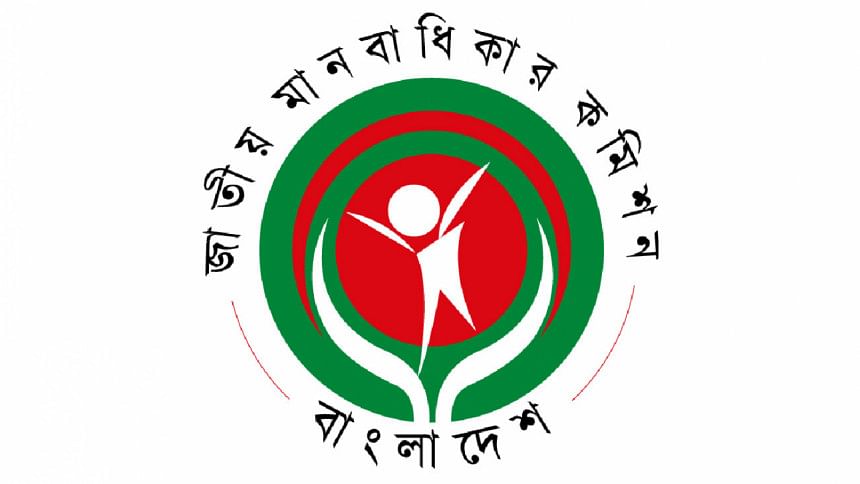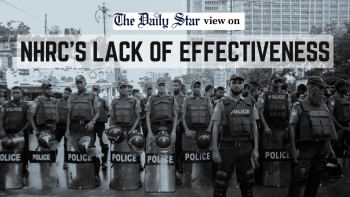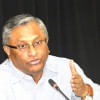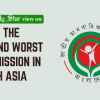NHRC response to The Daily Star editorial

We are writing to express our deep concern regarding the recent editorial published in your esteemed newspaper, titled "A rights body that remains paralysed." While we appreciate your effort to analyse the annual report 2023 of the NHRC, we feel compelled to address the inaccuracies and misunderstandings that were presented in your publication. The article unfairly criticises the investigative powers of NHRC and labels it as a "paralysed body." We strongly disagree with this characterisation, as it overlooks the significant contributions and achievements of the institution in various aspects of human rights protection and advocacy which ultimately contribute to upholding the rights enshrined in the Universal Declaration of Human Rights (UDHR).
It is important to recognise that while the investigative power against Law Enforcing Agencies (LEAs) is indeed a crucial aspect of the institution's mandate, it is not the sole indicator of its effectiveness. The NHRC is actively engaged in addressing a wide range of human rights violations and making impactful interventions across various sectors of human rights. These efforts are clearly documented and reflected in the NHRC's annual report for 2023.
Last year, the NHRC disposed of 665 out of 1058 complaints, including 122 cases initiated on its own accord (suo moto complaints). The annual report, particularly pages 37 to 50, vividly showcases numerous successful interventions, with notable activities highlighted in part three; such as contributing to stop child marriage, violence against women. protection of the rights of the Dalits, Hijra, migrant workers, person with disabilities, paying regular visits to the prisons, holding public hearings, etc. These interventions have had a profound impact on society, benefiting millions of community members of the country directly or indirectly. How did the NHRC manage to undertake such a multitude of activities within a single year despite being labelled as "paralysed"?
Unfortunately, these significant achievements have been unjustly overlooked and misrepresented, resulting in a derogatory portrayal of the NHRC in the public eye. Such discouraging words undoubtedly stand as an impediment towards prosperity of a national rights body. Furthermore, we believe that the article demonstrates a lack of understanding of the complexities of human rights issues and the multifaceted approach required for their resolution. Human rights violations extend beyond the scope of investigative powers against LEAs and encompass a broad spectrum of social, economic, and political challenges. The Constitution of the people's republic of Bangladesh, International Covenants where Bangladesh is a party, UDHR and so on enshrine various spectrum of human rights issues which deserve to be dealt with but the article failed to consider all these.
We urge your editorial to exercise greater diligence and responsibility in reporting on matters concerning NHRC and to refrain from making unsubstantiated claims that undermine the institution's credibility and reputation. We also encourage you to consider the broader context and implications of your reporting on issues related to human rights and institutional effectiveness.
In conclusion, we respectfully request that you publish this response to provide a more balanced and accurate perspective on the work of NHRC. We remain committed to promoting dialogue and understanding on issues of national importance and look forward to constructive engagement with your publication in the future.
Thanking you,
Sebastian Rema
Secretary
National Human Rights Commission (NHRC), Bangladesh
Our response
Through our editorial, published online on April 5 and in print on April 6, we aimed to support the NHRC's own demand that the government should let the commission investigate law enforcers. As per its annual report, almost two-thirds of its enquiry requests—78 out of 122—to the home ministry over cases of human rights violation by law enforcers have been ignored. Even if it is not the sole indicator of the commission's effectiveness, it is a major indicator, and the fact that the NHRC itself wants an amendment to the law constraining its investigative power demonstrates this. Moreover, this constraint is also one of the primary reasons why the commission is not considered fully independent.
Section 18 of the NHRC Act, which restricts the commission, has been one of the reasons why NHRC is considered a "Category B" organisation by the Global Alliance of National Human Rights Institutions (GANHRI), which assesses all the national human rights institutions of the world on how compliant they are with the Paris Principles. And the NHRC does not have the independence guaranteed by the Paris Principles. This is also evident by the fact that the Bangladesh National Human Rights Commission has come second-to-last in South Asia, as per an evaluation by the Asian NGO Network on National Human Rights Institutions (ANNI).
We acknowledge the NHRC's many achievements—the fact that it has managed to do so much, despite the shortcomings, is to its credit. However, if it cannot hold state agencies accountable, then we stand by our editorial that it is, indeed, paralysed. We strongly believe the commission could do a lot more with greater independence.

 For all latest news, follow The Daily Star's Google News channel.
For all latest news, follow The Daily Star's Google News channel. 









Comments